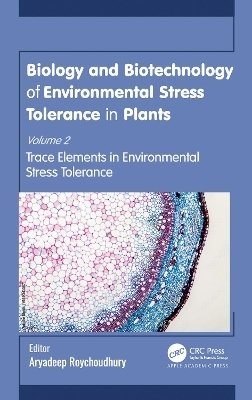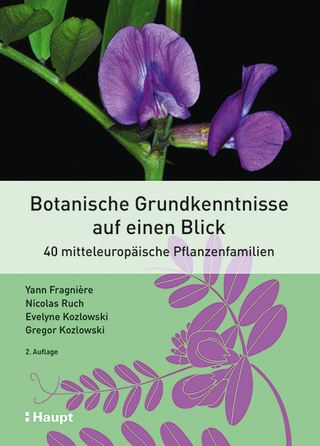
Biology and Biotechnology of Environmental Stress Tolerance in Plants
Apple Academic Press Inc. (Verlag)
978-1-77491-285-0 (ISBN)
Abiotic stresses such as drought, high salt, cold, heat, UV radiation, heavy metal pollution, etc., are increasingly responsible for restricting plant growth and agricultural production and are becoming more alarming due to threats from global climate change. To combat these threats, this new 3-volume set provides a comprehensive understanding of the mechanisms that mediate biosynthesis, accumulation, and degradation of plant metabolites to improve crop production and enhance abiotic stress tolerance in plants.
Volume 1: Secondary Metabolites in Environmental Stress Tolerance focuses exclusively on the diverse secondary metabolites that play a major role in the adaptation of plants to the environment and in overcoming stress conditions as well as their implications in enhancing tolerance mechanisms. The book presents information on the protective roles rendered by a wide array of antioxidative secondary metabolites and their regulation during diverse environmental stress.
Volume 2: Trace Elements in Environmental Stress Tolerance throws light on the different inorganic trace elements, including metal nanoparticles, that help to deal with various environmental stresses. While these elements at high level create considerable phytotoxicity and halt metabolic and enzymatic activity, they also promote growth and development in limited quantity, so that they have significant potential in revamping plant morphology and physiology under stressed conditions. Hence, optimum concentration management of these elements can help to mitigate world hunger and contribute toward sustainable agriculture and food security under challenging environments.
Volume 3: Sustainable Approaches for Enhancing Environmental Stress Tolerance focuses on agronomic and biochemical approaches as well as biotechnological and high-throughput technologies, including the prospects of genetic engineering, epigenetics and the latest CRISPR/Cas technology in generating stress-tolerant plants. The volume provides a clear roadmap for the implementation of techniques for improving abiotic stress tolerance in plants for better sustenance.
Aryadeep Roychoudhury, PhD, has over 20 years of research experience in the field of abiotic stress responses in plants with perspectives of physiology, molecular biology, and cell signaling under diverse stress conditions. He currently is Assistant Professor at the Department of Biotechnology, St. Xavier’s College, India and also handles several government-funded projects on abiotic stress responses in rice. To date, he has published many books, book chapters and over 200 papers in peer-reviewed journals. He is a regular reviewer of articles in high-impact international journals, a life member of several scientific associations and societies, and the recipient of a Young Scientist Award 2019, conferred by the International Foundation for Environment and Ecology, at the University of Allahabad, India. His name is included in the Stanford University’s List of the World’s Top 2% Scientists.
Part 1: Trace Elements in Sustaining Plant Growth 1. Trace Elements in Mitigating Environmental Stress: An Overview 2. Trace Elements and Their Role in Abiotic Stresses 3. Exogenous Application of Trace Elements and Their Uptake by Plants to Mediate Abiotic Stress Tolerance Part 2: Individual Trace Elements in Tolerance 4. Role of Iron and Manganese in Tolerance against Different Environmental Stress 5. Role of Zinc in Tolerance against Different Environmental Stress 6. Role of Silicon in Tolerance against Different Environmental Stress 7. Role of Selenium in Tolerance against Different Environmental Stress 8. Role of Nickel as a Potent Environmental Stress Reliever in Plants 9. Role of Cobalt in Plant Growth and Tolerance against Different Environmental Stresses 10. Role of Molybdenum in Tolerance against Different Environmental Stress 11. Role of Copper in Tolerance against Different Environmental Stress 12. Role of Sulfur in Plant Tolerance to Environmental Stress 13. Role of Chloride and Organic Acid Anions in Environmental Stress Tolerance 14. Role of Sulfur in Protection against Major Environmental Stress in Plants Part 3: Nanoparticles in Stress Tolerance 15. Application of Nanomaterial-Based Technology in Stress Management of Plants 16. Role of Nanoparticles in Tolerance against Different Environmental Stress 17. Nanotechnology and Use of Nanoparticles in Developing Environmental Stress-Tolerant Plants
| Erscheinungsdatum | 25.07.2023 |
|---|---|
| Zusatzinfo | 29 Tables, black and white; 7 Line drawings, color; 29 Line drawings, black and white; 1 Halftones, color; 2 Halftones, black and white; 8 Illustrations, color; 31 Illustrations, black and white |
| Verlagsort | Oakville |
| Sprache | englisch |
| Maße | 156 x 234 mm |
| Gewicht | 1440 g |
| Themenwelt | Naturwissenschaften ► Biologie ► Botanik |
| Technik ► Umwelttechnik / Biotechnologie | |
| Weitere Fachgebiete ► Land- / Forstwirtschaft / Fischerei | |
| ISBN-10 | 1-77491-285-6 / 1774912856 |
| ISBN-13 | 978-1-77491-285-0 / 9781774912850 |
| Zustand | Neuware |
| Informationen gemäß Produktsicherheitsverordnung (GPSR) | |
| Haben Sie eine Frage zum Produkt? |
aus dem Bereich


